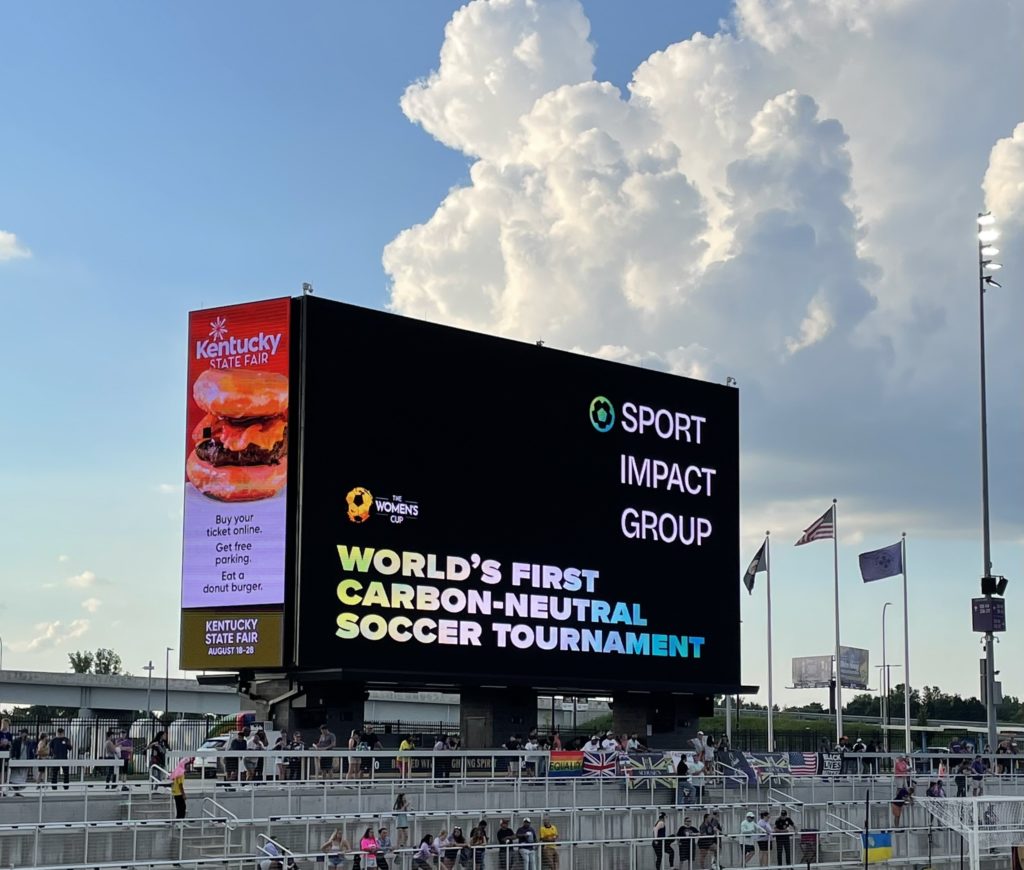THE WOMEN’S CUP KICKS CLIMATE CHANGE
Tackling the climate crisis is a team effort and as we move into 2023 we have to keep working together to support the environment. The 2022 Women’s Cup in Louisville set a trailblazing example by becoming the first-ever carbon-neutral pro soccer tournament. WIS member Jan Winter is a cofounder of The Sports Impact Group Louisville (SIG) and played a significant role in ensuring the August 2022 tournament set this environmentally-conscious precedent. Jan told our squad: “We founded [SIG] in 2020 with a vision to increase the impact of having a top-tier professional women’s soccer team in Louisville, Racing Louisville FC. We produced this year‘s tournament as the first carbon-neutral professional soccer tournament in the world. (Beating the men’s World Cup by about three months!)”
WHAT MAKES A SOCCER TOURNAMENT CARBON-NEUTRAL?
Unlike an individual’s daily efforts to reduce their carbon footprint, like rocking up to soccer practice with a reusable water bottle, limiting the impact large-scale events have on the planet is much more complex. A carbon-neutral event doesn’t mean there are no emissions, rather the event offsets any negative impacts with environmental contributions. In the case of The Women’s Cup, SIG and Racing Louisville FC teamed up with other local entities to create a carbon-neutral offset plan. In this exclusive Women in Soccer interview, Jan filled us in on exactly how the carbon-neutral tournament was produced and how others in the sports industry could learn from The Women’s Cup and hopefully do the same.
WIS: To make The Women’s Cup carbon-neutral was there a specific model you were following? How did you know where to start?
Jan Winter: This whole initiative was launched as a result of Mae Marks (SIG co-founder) attending a conference put on by Canopy, a Louisville nonprofit which helps companies and nonprofits understand sustainability. We then discovered that this year’s March Madness NCAA men’s basketball tournament in Indianapolis was produced sustainably. And we saw quotes that said it wasn’t difficult and it wasn’t that expensive. We then realized that no other soccer tournament in the world had been produced as carbon-neutral. That’s when we realized we could do what our mission says we do: increase the impact of having a pro women’s soccer team in our city. In this case, by putting them on the map, so to speak, around a global sustainability first! That was really exciting. Once we told folks our plans, everyone jumped in to collaborate. We reached out to others in our network for advice and counsel. One was JK McKnight, the founder of the Forecastle Festival, an annual music event in Louisville. It was the first outdoor music festival to be produced sustainably, in 2017. Since its inception in 2006, Forecastle has plowed new ground by promoting environmental best practices like reducing waste and subsidizing clean energy. Partnering with Arcadia Power, which was founded by another Kentuckian, Kiran Bhatraju, Forecastle set the standard for responsible entertainment events. These people were incredibly generous in sharing the wisdom they normally offer for sale. It’s important to note that there are many ways to interpret “sustainable” as a business concept. We looked at several models and created a unique set of metrics that we researched and put into place for this tournament.
How do you collect metrics and energy usage data?
We worked with stadium staff and The Women’s Cup folks to learn historical data that allowed us to predict actual data for figuring out the carbon footprint of The Women’s Cup. We had to predict what it would cost us to offset that footprint before we could decide if we could do it. So one thing we requested was electricity and natural gas usage over several months, including during and between seasons. Lynn Family Stadium is the home of both Louisville City FC and Racing Louisville FC games, as well as special events like a Janet Jackson concert on Kentucky Derby night this year. We also looked at food vending, including the percentage of products that contained meat, as well as products such as swag for sale. We did due diligence to figure out a reasonable expectation of energy use that could accurately predict the cost of offsetting that carbon footprint with renewable and verifiable actions.
When it comes to an offset carbon-natural plan, were your partners’ Canopy and Kale + Flax directly involved?
They were directly involved in helping us figure out how to make this happen. Canopy is a local nonprofit that created Kentucky’s first certification for the global Good Business Movement, with requirements around external impact, among other metrics. It helps companies like ours understand how to continuously improve and track progress around sustainability. While SIG really has very little actual energy usage because we are totally virtual, Canopy is helping us understand how to become leaders in our community in bringing to fruition sustainability projects like the one we achieved with The Women’s Cup.
Kale & Flax is a human-centred design company and micro-accelerator in Louisville that created our website and helps us understand the language and deliberateness of sustainability. They help startups like ours root their work in improving the world around them. We, in turn, gave those two companies a global platform for demonstrating the efficacy of their processes in a real-world way.
How did the carbon-neutral plan affect fans?
We think it’s really important to add that this initiative was far from being onerous to fans. We did it without asking people to ride bikes to games or only use non-disposable containers for food and drink or only wear second-hand clothing. We did it in a way that enhanced their fan experience. The achievement was noted on the jumbotron during games at the tournament, and each time produced a very enthusiastic response from the crowd!

We wanted to very clearly demonstrate that sustainability is not hard or very expensive to achieve, and these kinds of costs should be baked into the budget of any entertainment event, especially sporting events, which are disproportionately affected by climate change. For example, something like 10-15 percent of English Premier League games are negatively affected by extreme weather. No one’s talking about the additional expense of producing a men’s World Cup in a country that is so hot in the summer the tournament had to be deferred to November and December and condensed to 28 days for the first time. We can only imagine the cost to the pro teams who are disrupting their entire regular schedules so players can play for their national teams. Not to mention the cost and energy use of air-conditioning a bunch of soccer stadiums. It’s just not sustainable.
Do you believe that tackling climate change is a team effort?
Yes! 99% of the world’s science community has concluded climate change is “anthropogenic,” that is, caused by an unnatural, human-caused increase in the greenhouse effect. So it’s on us. The world’s population can and must change our behavior to preserve the goodness of Mama Earth.
***
Our squad is super proud of the work being done by Jan and the whole team that was involved in The Women’s Cup this summer. Plus, we’re extra excited that the women’s game was the first to set this large-scale environmentally-conscious standard. Soccer is the world’s most popular pastime and starting these conversations and implementing sustainable practices on and off the pitch could be a global gamechanger!
Interested in learning more about how YOU can reduce the carbon footprint at your club? Send us an email at hello@womeninsoccer.org and we’ll connect you to the experts!



